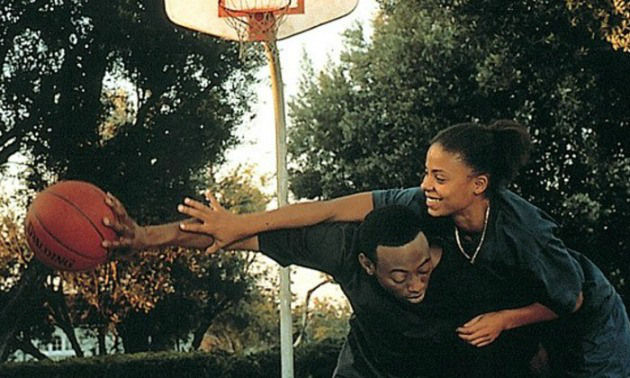
Love & Basketball
I have been in love with Love & Basketball since I was 11, and the s— won’t go away.
OK, no — I was more like 13 or 14 when I first saw the movie, but that reference opportunity was too golden to pass over.
I only watched it because it had basketball in the title, and at that point in my life, I was a fiend for the sport. Two hours later, my hopes that the film would be Like Mike with grown-ups had not been met. While it didn’t contain the emotional depth that only Lil’ Bow Wow and the kid from The Little Vampire could provide, Love & Basketball was without a doubt one of the best romantic movies I’d seen at that age.
Split into four quarters — like a basketball game — the movie follows the loveship and the hateship between two basketball players as they grow older. When it came out in 2000, it was the big-screen directorial debut of Gina Prince-Bythewood, whose new movie Beyond the Lights hits theaters today. While the young director went on to achieve more success in 2008 with The Secret Life of Bees, much of the rest of what made Love & Basketball great remained in 2000. It crystallized as this solitary movie triumph that could never be replicated.
But I was hesitant to embrace Love & Basketball. As a white male watching a romantic movie with a nearly all-black cast, people like me didn’t exactly make up the bulk of the movie’s fan base. As kids, there’s this idea that there are boy movies and there are girl movies, and it’s something that lasts way too long into our adult lives. Like any art form, a movie should not be restricted to one audience based on the themes of its content or the race of its cast. What I realize now is that there is no such thing as a guy movie or a girl movie or a white movie or a black movie. There are only good movies and bad movies, and Love & Basketball is a damn good movie.
Both leads, Sanaa Lathan as the calm, strong Monica Wright and Omar Epps as the confident, masculine Quincy McCall, will forever be defined by their roles. The story itself takes place in such specific time frames (’80s and ’90s, upper-class black Los Angeles) that it feels like part love story and part cultural snapshot.
Contributing to that cultural feel is the film’s soundtrack. Put simply, it is a masterwork. “Love and Happiness” in the opening credits? Brilliant. “I Want to Be Your Man” at prom? Inspiring. “Fool of Me” during the final one-on-one game? Unparalleled. I am the fool every time I hear that song. I am the fool. The Maxwell cover of “A Woman’s Work” that plays in the movie’s first love scene? Goosebumps. Pure genius. The song selection in this movie is an art form; it has be in the conversation for best soundtrack ever assembled.
The script, written by Prince-Bythewood herself, finds a great balance between romantic (minus the typical cheese) and hip. Love stories often tend to take on old-school feel, but Love & Basketball does its own thing. It shuns all standard gender roles between men and women and simply shows the dynamic between two competitive, passionate people. Whose dream of playing basketball is more important? Is that answer shaped simply by their gender, or should it be formed by something else?
The film also touches on the adaptation of long-term relationships and the juggling act of priorities to which anyone who loves something besides his or her significant other can relate. The movie’s realism is a stark contrast to the “charming” fauxmance crap that was peddled into theaters then and still is now. Even the user-made YouTube montages of this film have more heart than a standard romantic movie.
The script and the acting are both so well done that by the time we get to this exchange in the movie’s seminal scene, there is no such thing as cheesy:
Monica: I’ll play you.
Quincy: What?
M: One game. One-on-one.
Q: For what?
M: Your heart.
In the case of one young boy watching in search of hardwood heroics and instead finding something else completely, this movie won. Love & Basketball won my heart. There is no such thing as cheesy.



